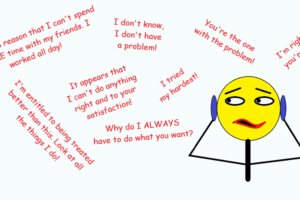
For 40+ years I have worked in the field of domestic abuse. In the beginning of my career, I worked with victims of domestic abuse. For the last 30 years I have worked primarily with the batterers, the perpetrators of domestic abuse.
During the course of that 40+ years I have done hundreds of presentations about domestic abuse to mental health professionals, doctors, nurses, students, judges, lawyers, police, child protection workers and the public. My presentations have been at schools, colleges, professional conferences, hospitals, police stations and churches.
Having done this education and training nationwide (Maine to California) for over 4 decades, I still feel angry, sad, frustrated and annoyed when I am asked, “Why does she stay?” Everyone wants to know why a victim would stay in a relationship with someone who is abusing her and/or her children and pets.
Why are victims of domestic abuse still being blamed for the abuse being perpetrated on them?
The question I wish people would ask me is, “Why does he abuse?” That is the right question. It puts the responsibility on the batterer, not the victim.
Empathy
The only way people can start to understand the reasons why victims of domestic abuse would stay in an abusive relationship is if they have empathy.
The sad part is that even if someone has been traumatized themselves, many do not have empathy for victims of domestic abuse. Repeatedly I hear “If someone abused me, I would be out of there so fast!” Or, “I left, why can’t everyone?”
It just isn’t that easy.
In terms of understanding why someone doesn’t leave, please read my blog on How People Become a Frog in Water. The blog will help you understand the cycle of abuse.
For many victims of domestic abuse, abuse does not end when a relationship ends. Many times people will “stay together for the sake of the children” where a separation may be much healthier for all involved.
Bad Boss Activity
Long ago I created the Bad Boss Activity to help people understand why victims stay in an abusive relationship.
When possible, I would have a large group break into smaller groups of 6 – 10 people. People seem to be the most willing to talk and share in smaller groups.
Each group would be handed a sheet of paper and a marker. One person was designated the “scribe”, or the person who wrote down the responses from the smaller group members.
I would start off by saying, “Most of us in here have a had a job, right?” Most in the audience would laugh and say, “Yes” or they would nod their heads affirmatively.
Then I would add, “And most of us have had a bad boss, right?” Again, there would be laughter and comments affirming they had a bad boss.
Question One
My instruction was then for each group to identify 3-5 characteristics of a bad boss. The scribe would write those characteristics down on their sheet of paper. This activity usually lasted about 10 minutes. Most people have had a job and most people have had a bad boss. There is usually a lot of laughter and participation in their activity.
Examples usually included:
- Thoughtless
- Selfish
- Inconsistent, sometimes okay, sometimes horrible
- Did whatever they wanted, but expected me to follow the rules
- Played favorites
- Didn’t listen when I made a request about my schedule
Question Two
The second part of this activity had to do with their job itself. I would usually say something like, “So a lot of you said you have had a bad boss. Did you stay at that job, with a bad boss?” The participants had loosened up a little after working in a smaller group to answer the first question. Most people would groan and say they had stayed at the job anyway.
The second question for answering was, “List 3–5 reasons why you stayed at a job with a bad boss.” This part usually went by fairly quickly.
Examples usually included:
- The pay
- I stayed until I found something better
- Enjoyed my co-workers
- It wasn’t bad all of the time
- I liked my job, just not the boss
- My job was close to home
The Correlation
Once the second activity was completed, I would them ask the participants to look at their first list, about characteristics of a bad boss. Then I would ask the group: “Do any of your characteristics of a bad boss sound like a batterer? “Is a batterer selfish? Or thoughtless? Is a batterer inconsistent, sometimes loving and sometimes abusive? Does a batterer so whatever they want, but expects the victim to follow the rules?”
The participants stop joking. They start looking at each other. They are silent. They know where this is going.
Then I ask the participants to look at the second list, the list about why they may have stayed in a job with a bad boss. “Are the reasons you may have stayed at a job with a bad boss the same reasons why a victim of domestic abuse may continue to live with their batterer? For example, two incomes are always better than one. Might you stay until you developed a new support system? Maybe you enjoyed the company of the batterers’ family, or maybe you liked being a day-to-day parent? Maybe he wasn’t abusive 24/7. Maybe you liked your home, and mostly life was okay.”
By this time, the room is totally silent. They have started the process of empathizing with a victim of domestic abuse, and why she might stay in an abusive relationship.
Take Away Point
Unless you can empathize, you cannot understand. This Bad Boss Activity is similar to my Paper Dolls Activity BIP Program And Paper Dolls Exercise. Learning about domestic abuse, batterers and victims can go a long way toward avoiding the wrong question, “Why does she stay” to asking the right question, “Why does he abuse?”
Once you can understand and empathize, you can help be a positive, supportive voice for victims of domestic abuse.
With warmest regards,
Thank you so much for reading this blog. If you enjoyed the content, please check out other blogs at:
https://relationshipsrelearned.com/staging/9213/1
https://rvingnomads.com
To be notified of future posts, please enter your email address and click on the Subscribe button.







